Anass KHANCHOUFI “Our Goal : make Rwanda a regional innovation hub for Sustainable Agriculture”
OCP Africa, a global leader in fertilizers, has launched an ambitious factory in Rwanda to transform the country's agriculture. By focusing on the customization of fertilizers and technological innovation, the company aims to improve soil health, increase agricultural productivity, and ultimately promote a transition to sustainable agriculture. Exclusive interview with Anass KHANCHOUFI, CEO of Rwanda Fertilizer Company Ltd.

Interviews conducted by Dounia Ben Mohamed in Kigali
In 2023, Rwanda inaugurated a fertilizer blending factory with an annual capacity of 100,000 tons, thanks to a partnership between OCP Africa and the Rwandan government. This project was initiated following the state visit of King Mohammed VI in 2016. What was the initial idea?
The central idea behind our initiative is not limited to providing access to fertilizers, but rather aims to profoundly transform Rwandan agriculture by integrating technology, science, and innovative solutions to improve soil health in the long term. Our goal is to facilitate a just and rapid transition to sustainable agriculture that respects the environment and natural resources.
In this perspective, we have established a strategic partnership with the Rwandan government to contribute to the improvement of the country’s food security. This partnership aims to support farmers in adopting agricultural practices that enhance productivity while preserving ecosystems.
The construction of our blending factory represents a crucial step in realizing this vision. It symbolizes our holistic approach, which goes far beyond simple fertilizer distribution. Indeed, we offer customized fertilizers tailored to the specific needs of soils and crops, and we integrate advanced digital solutions to assist farmers in their daily decision-making.
Furthermore, our investment in research and development (R&D) is essential to optimize the entire supply chain. By combining these efforts, we aim not only to strengthen agricultural productivity but also to create innovative solutions to meet the future challenges of agriculture and ensure sustainable food security for generations to come.
How has the project evolved since the factory’s construction?
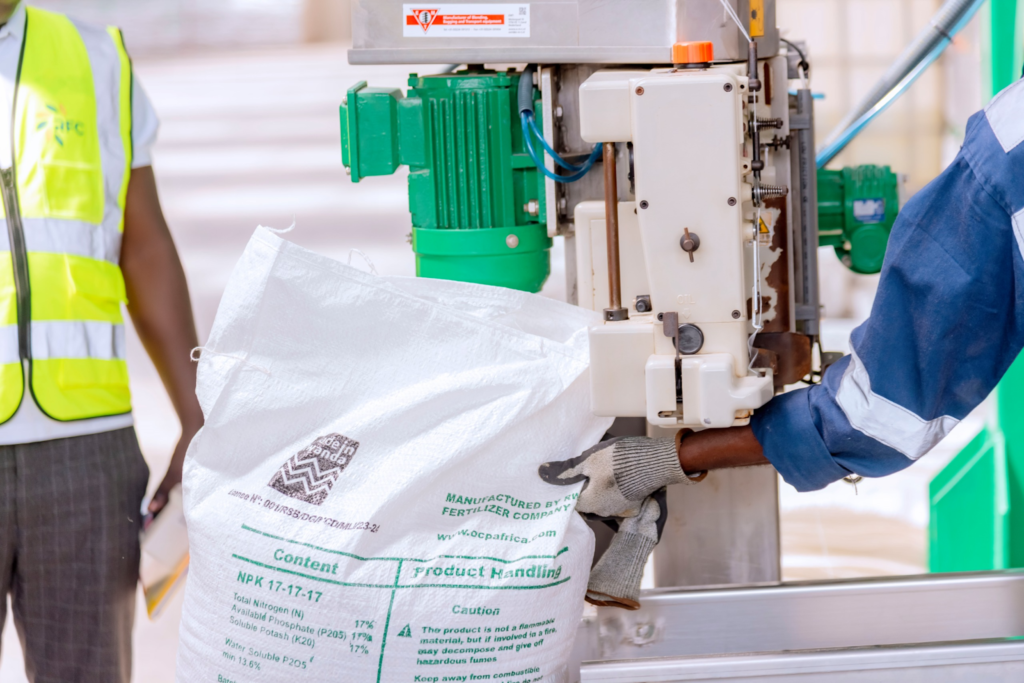
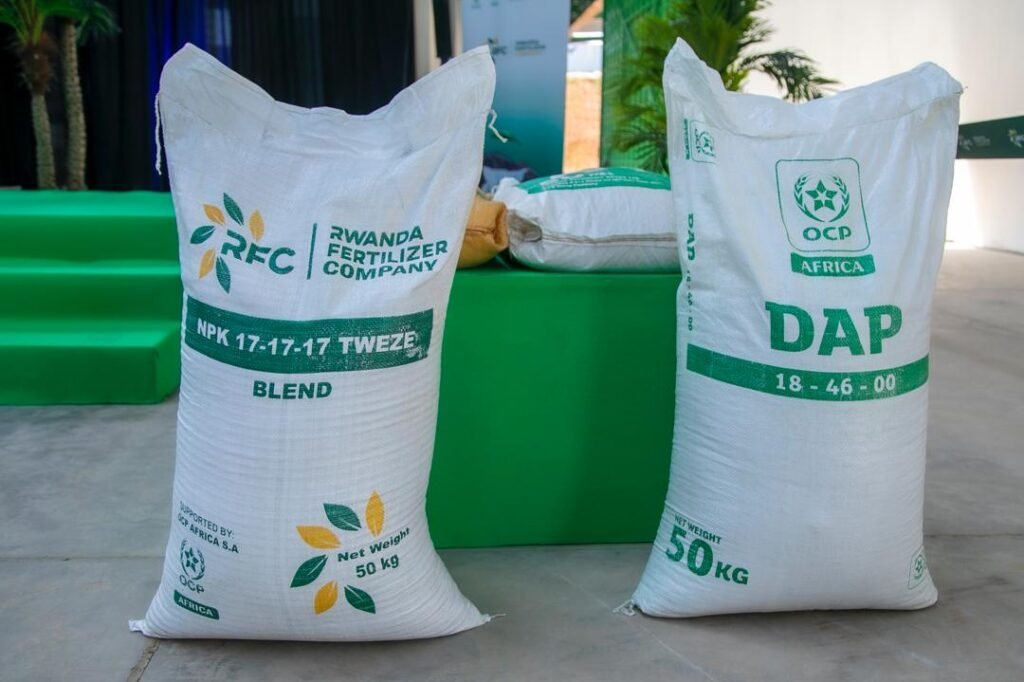
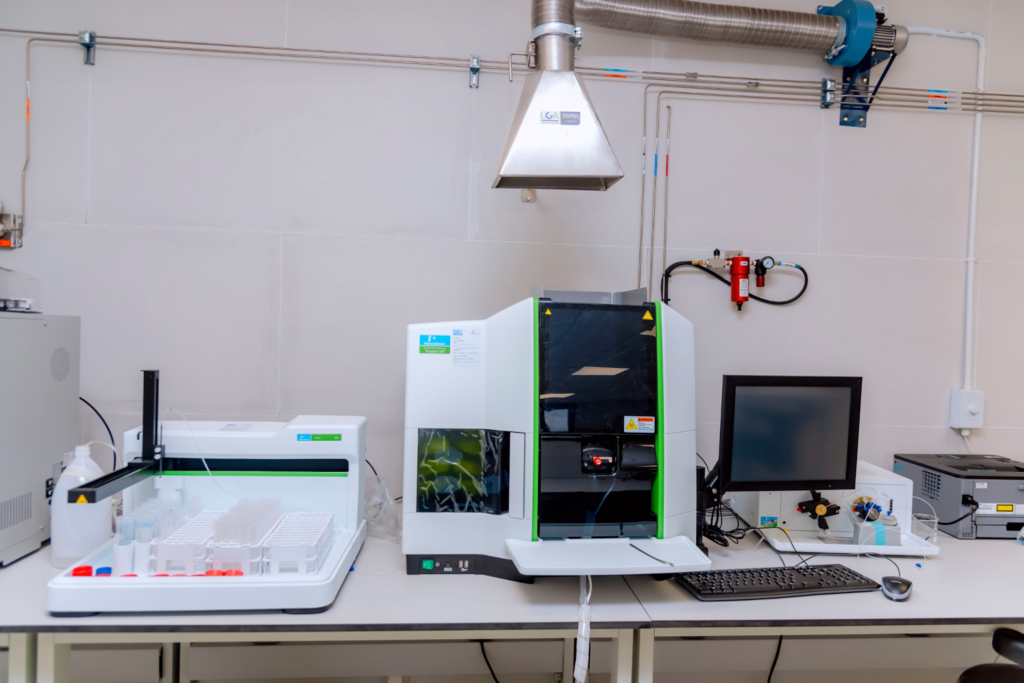
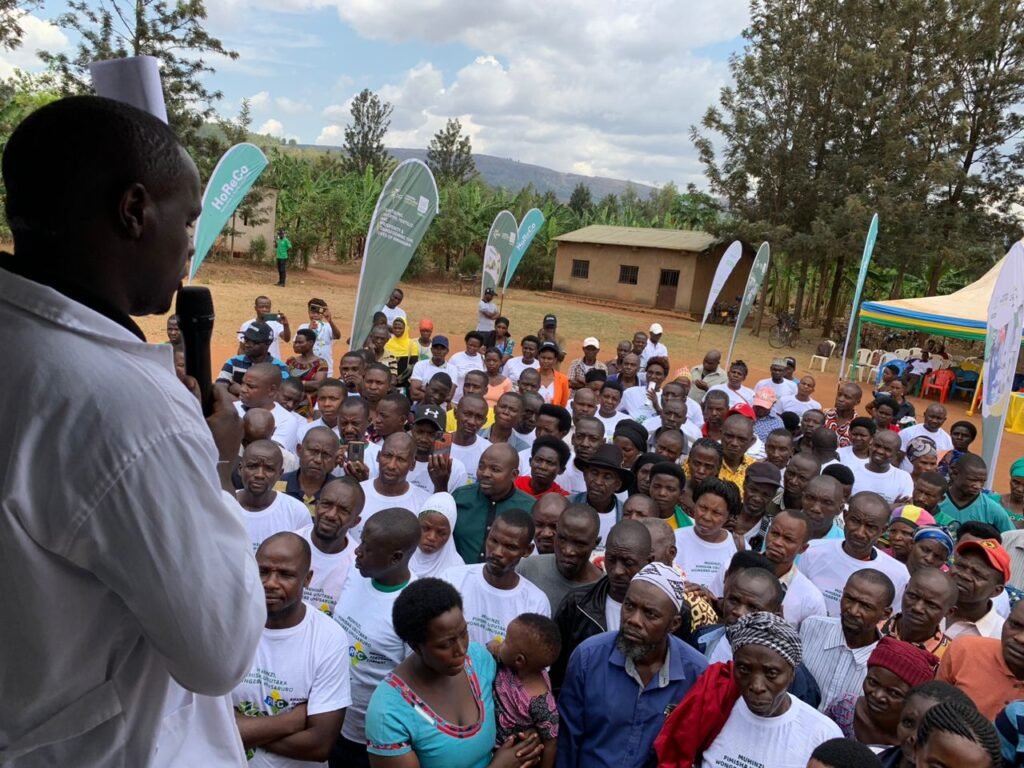

Since its production started at the end of 2023, our factory has positioned itself as a key player in Rwanda’s agricultural sector. With an annual production capacity of 100,000 tons and a storage capacity of 25,000 tons, this modern facility is designed to effectively meet the growing needs of farmers across the country. The factory is also equipped with a state-of-the-art high-tech laboratory capable of analyzing both soils and fertilizers, thus ensuring optimal quality and personalized recommendations for each type of crop.
Our approach is based on a fundamental principle that we call the « 4Rs »: delivering the right nutrients, in the right dosage, at the right place, and at the right time. This strategy is essential for maximizing agricultural productivity while preserving soil health and minimizing environmental impact. By adopting this rigorous scientific method, we are committed to supporting farmers in optimizing their practices to enhance food security and sustainable development in the agricultural sector.
Training a new generation of talents capable of leading the fertilizer industry in the country
In just one year, our company has observed a significant improvement in agricultural productivity, reflecting the effectiveness of our customized fertilizers. For example, a farmer in the Western region, specializing in potato cultivation, saw her production increase from 16-18 tons to 20 tons per season, thanks to the use of our products. This result highlights not only the quality of our fertilizers but also our commitment to supporting farmers in optimizing their yields and increasing their incomes.
Our partnership with the Rwandan government has played a crucial role in the significant improvement of agricultural productivity, particularly for crops like maize. In 2023, this collaboration led to an impressive 30% increase in maize production, rising from 390,979 tons in the 2023A season to 507,985 tons in the 2024A season. This remarkable progress reflects the effectiveness of our approach to agricultural innovation and support for local farmers. Meanwhile, fertilizer use in Rwanda has also seen a notable rise, increasing from 59.6% to 64.5% adoption among farmers. This penetration rate of fertilizers represents a first in the region, illustrating the concrete results of joint efforts to make agricultural inputs more accessible and encourage large-scale usage. Alongside these advancements in the fields, our factory has also played a key role in the socio-economic development of the region. Since its establishment, it has generated 50 direct jobs, with a majority of women in its workforce. This inclusive hiring reflects our determination to promote gender equality and provide economic opportunities to often underrepresented groups.
Our mission goes beyond mere job creation. We are actively investing in the skill development of local workers by offering tailored training. The goal is to prepare a new generation of talents capable of taking on responsibilities in the fertilizer industry and contributing to the sector’s growth in Rwanda.
It is in this context that we have formed a strategic partnership with the Rwanda Institute for Conservation Agriculture (RICA) in Bugesera. This partnership allows us to regularly host students for practical internships within our company. These young talents thus benefit from on-the-job training, with the prospect of employment opportunities at the end of their studies. This collaboration with RICA illustrates our commitment to building a sustainable ecosystem where agricultural innovation and human development go hand in hand.
Rwanda is a small, landlocked country, which does not facilitate the development of agro-industry. How have you responded to these challenges?
Our product, Tweze, is well received by farmers, who take pride in supporting a locally made product
One of the main challenges Rwanda faces is its geographic isolation, making the supply chain more complex and costly. Aware of this reality, we have focused our efforts on the local market by multiplying our distribution centers across the country. This expansion allows us to make our products more accessible to farmers while reducing delivery times and costs.
At the same time, we have increased our production capacity to meet not only national demand but also that of neighboring markets, such as Uganda, Burundi, and the DRC. This regional expansion reinforces Rwanda’s position as an agricultural hub in the region, while promoting cross-border trade of quality agricultural products.
Another crucial aspect of our strategy is the promotion of our flagship product, « Tweze, » a locally manufactured fertilizer whose name means « more yield » in Kinyarwanda. This product has been extremely well received by farmers, who express particular pride in supporting a national product. The adoption of Tweze by the agricultural community reflects the growing confidence in local solutions to improve yields and strengthen food security in Rwanda and beyond.
The company now offers « made in Rwanda » products on the local market. In terms of price and accessibility, how do you differentiate from previous solutions available?
Our main mission is to provide highly customized fertilizers specifically tailored to the unique needs of soils and crops in Rwanda. Through a scientific approach and thorough soil analysis, we have not only improved crop quality but also succeeded in reducing accessibility costs for farmers. This winning combination allows for increased yields while making our solutions more affordable and accessible to a larger segment of the farming population.
For the coming year, we aim to expand our product portfolio to develop even more targeted solutions adapted to the agroecological specificities of each region of the country. This expansion aligns with our vision of creating a sustainable agricultural ecosystem where every farmer can access the nutrients best suited to their lands, thus maximizing productivity while preserving soil health in the long term.
Do you have plans to extend your activities beyond Rwanda?
For now, we are focusing on the Rwandan market, but we have completed our first export to the DRC. We aim to serve neighboring countries, particularly Uganda, the DRC, and Burundi, relying on local solutions to meet the specific needs of each region.
Furthermore, OCP AFRICA is also well established in the region through its offices in Kenya, Tanzania, Ethiopia, and Zambia. We also have customs warehouses in Mozambique, which allows us to better support supply chains and meet the needs of farmers throughout the East and Southern Africa region.
Rwanda is not spared from climate change. How do you support local actors to help them anticipate and produce better?
At OCP, we believe in the power of innovation, technology, and science to drive change
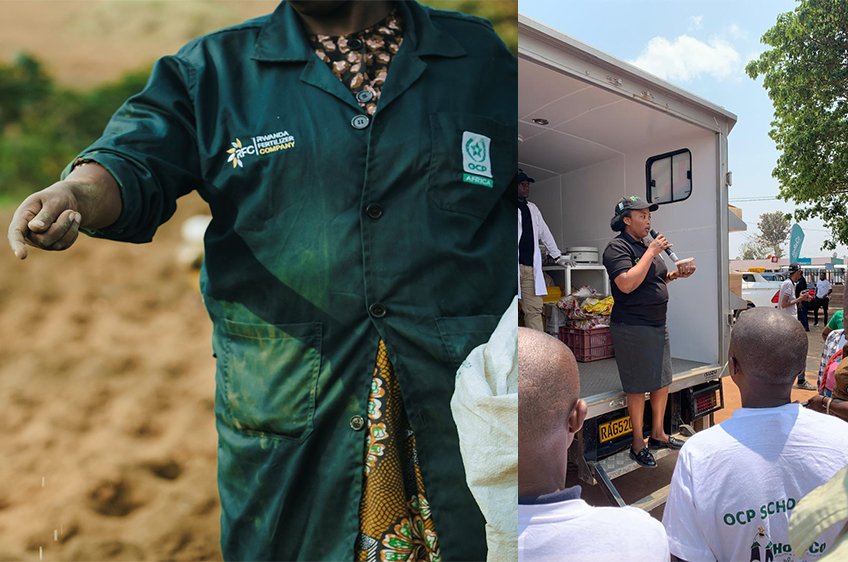
At OCP, research and development (R&D) is at the heart of our strategy. We firmly believe in the power of innovation, technology, and science to drive meaningful change in the agricultural sector. As a global leader in plant nutrition solutions and phosphate fertilizers, we are investing heavily in creating solutions based on both natural intelligence and new technologies, such as machine learning and artificial intelligence (AI). These innovations are essential for transforming the agricultural sector and addressing global challenges.
Among our flagship initiatives, we have developed technological tools such as digital soil mapping and the « Udongo » application, which provide farmers with personalized information and recommendations on managing their crops. We are also developing a Geospatial Identification System (GIS) platform, which offers historical data on soil health, crop rotation, and yield forecasts. These tools enable farmers to make informed decisions to optimize their yields.
By 2025, we plan to introduce seven new fertilizer formulations, in addition to the five already being launched in Rwanda. We are also developing new products based on Triple Super Phosphate (TSP), a phosphorus-rich fertilizer that will have a significant impact on agricultural productivity while promoting sustainable practices.
This R&D approach is strengthened by strategic partnerships with public and private institutions. For example, our digital soil mapping project is conducted in collaboration with the Rwanda Agriculture and Animal Resources Development Board (RAB), while the GIS platform is developed with the Bank of Kigali. This partnership allows us to integrate a credit scoring model, thereby facilitating real-time risk assessment for providing tailored financing to farmers.
We are convinced that the challenges of the agricultural value chain in Rwanda can be addressed through three pillars: capacity building, intersectoral collaboration, and targeted investments.
It is in this spirit that we launched the innovative OCP School Lab initiative, which revolves around two main aspects. First, we offer free soil analyses as well as fertilizer recommendations to farmers. Second, we provide training on best agricultural practices. To date, we have trained 35,000 farmers, and we intend to continue this initiative to reach even more beneficiaries. Additionally, in partnership with USAID, we are establishing « Farmer Houses, » one-stop shops where farmers can access fertilizers, machinery, training, and micro-financing solutions.
What are the next steps, your medium- and long-term roadmap?
We believe that the future of agriculture in Rwanda will be characterized by continuous productivity improvement and a transition to sustainable practices. Our role is to support this transformation by providing innovative solutions, strengthening local capacities, and contributing to the country’s economic development. We are committed to improving the agricultural ecosystem and supporting the growth of the agro-industry in Rwanda over the long term.
In parallel with our current initiatives, we plan to launch agribusiness activities in several regions of Rwanda to maximize impact across the entire agricultural value chain. For example, in Nyagatare, we plan to develop projects focused on rice cultivation, while at the Gabiro Agribusiness Hub, we will focus on maize. These initiatives aim not only to improve agricultural productivity but also to integrate processing and marketing activities for the products.
Our goal is to create successful local brands capable of serving not only the Rwandan market but also expanding to neighboring countries such as Uganda, Burundi, and the DRC. By adding the processing component and developing go-to-market strategies, we aim to position these products as benchmarks in terms of quality and competitiveness, both nationally and regionally.
Bugesera Fertilizer Blending Plant
- Investment: USD 19.2 million
- Area: 8 ha (including 4 ha for the factory and 4 ha for the experimental farm)
- Jobs: 50 direct jobs
- Annual production capacity: 100,000 tonnes
- Includes a storage unit of 25,000 tonnes
- A modern laboratory equipped with the latest analytical technologies for product quality control and soil analysis and characterization
- The factory aims to increase crop yields by 40% through customized formulations optimizing soil health and nutrient balance
OCP School Lab and other initiatives (Udongo, GIS, Demo Plots, Farmer Houses)
- Investment: USD 2.5 million over 3 years
- Goal: to train 150,000 farmers across 30 districts
- Digital Soil Map for 1,500,000 ha of Rwandan soils
- 12 customized formulations for Rwandan soil by 2025






